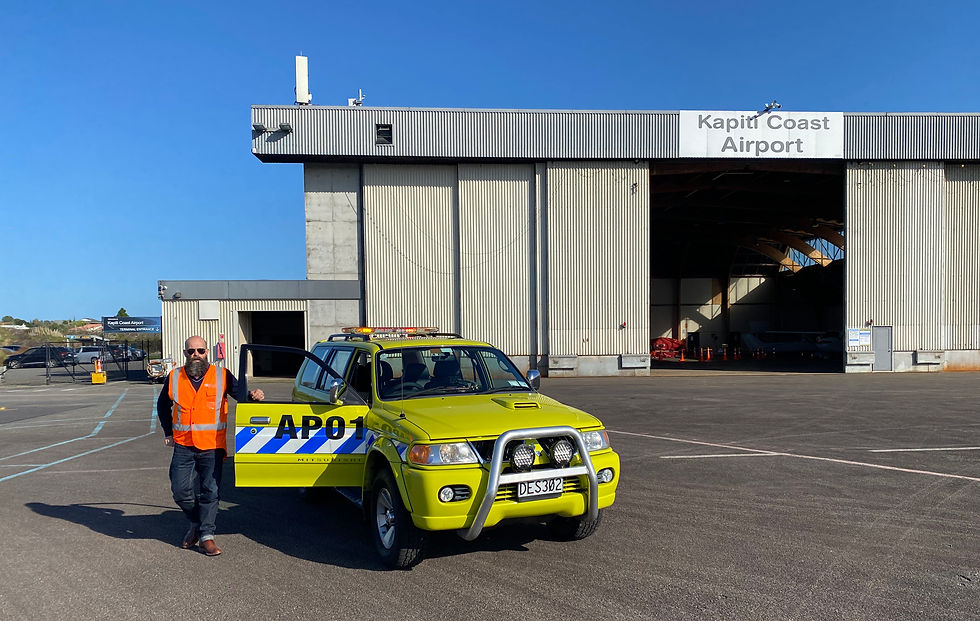What are Aerodrome Audits and why should you care?
- Tracey Larsen

- Jul 30, 2025
- 3 min read
An aerodrome is a term used to describe any location intended for aircraft flight operations to take place. This could be any Heliport, Airport, Airfield or Airstrip.
An audit is an independent evaluation of any Heliport, Airport, Airfield or Airstrip’s operations, safety procedures, and compliance with Civil Aviation Authority (CAA) regulations.
You should care because ensuring the safe operation of aerodromes helps minimise risks while maintaining operational and safety standards.
Who owns the risk for an Aerodrome and is ultimately responsible for making sure it is safe and fit for purpose?
Ultimately the buck stops with the aerodrome operator listed in the AIP. If only a company, council or hospital is listed as the operator or the aerodrome is not in the AIP then accountability will need to be established. The CAA and/or Health & Safety Officers will first look to see if there is an individual person or a role such as a Property, Infrastructure, Risk or Operations Manager officially assigned to managing the aerodrome, even if this is not their core function. If this person or role is not established, then accountability will need to be chased further up the tree to the Site or Group Manager and then the owner of the property or CEO of the company or council that manages the aerodrome. They will likely not know that they will be held accountable by the CAA and/or Health & Safety Officers if the aerodrome is not compliant or if there is an incident or accident.
Who owns the risk for your Aerodrome?

How often should an Aerodrome conduct an Audit?
Daily, monthly and quarterly aerodrome/runway inspections are all types of aerodrome audits that are regularly carried out by certificated and qualifying aerodromes.
If you are the operator of non-certificated aerodrome (this is every other type) and you are completing regular inspections, then that's great. If you are not completing regular inspections, then you should reconsider starting to do them and make sure they are recorded. Just in case....
It is generally recommended that some form of Aerodrome Inspection/Audit is completed annually. This is to make sure there are no new hazards and that everything is compliant with CAA rules and expectations to help protect and safeguard all stakeholders. An annual Inspection/Audit should be different to a regular inspection, going into more detail on site at the Aerodrome as well as auditing the Aerodromes documents.
If you think you don’t need to audit your aerodrome then you are silently saying to the CAA that the aerodrome is fit for purpose, but how do you know it is if you haven’t done an audit?
By conducting an annual audit you set a benchmark whereby you can measure any changes. You will be able to see and record the differences from year to year and then have the information to make improvements.

How can LAM help with your Aerodromes Audit?
We offer a range of services. For more information check out the options https://www.airportmanagement.co.nz/aerodrome-audits and get in touch with us today.
Full Audit: On-site and document review with detailed hazard identification and recommendations.
Site-Only Audit: Focuses on-site safety with a brief hazard summary and solutions.
Online Audit + Consultation: Complete the audit online, followed by a one-on-one follow up with one of our Airport Consultants.
FREE Aerodrome Document Audit: Online option to review essential Aerodrome documents for aviation compliance.
You can email us at info@airportmanagement.co.nz if you would like more information, a quote or a copy of our FREE Aerodrome Document Audit.
An aerodrome inspection/audit might just pick up something that will help prevent an incident or accident from occurring. Even if an inspection/audit doesn't pick up anything amiss, just by conducting an aerodrome inspection/audit you are being proactive and strengthening your aerodromes resilience as well as covering your legal responsibilities if there ever was an incident or accident.
Safe skies start on the ground. Manage your risks, know your responsibilities!
.png)



Comments